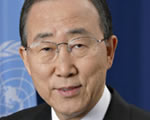 Go to main content
Go to main content
Archive Website of the UK government
Please note that this website has a UK government accesskeys system.
Main menu
Page menu
Government, citizens and rights

The United Nations

The United Nations (UN) is an international organisation created in 1945, after the end of World War II. The UK and 50 other countries signed the UN Charter - a commitment to preserve peace through international co-operation. Nearly every nation in the world now belongs to the UN, with 192 member countries.
The General Assembly
All countries in the UN are represented in the General Assembly - a 'parliament of nations' which meets to consider the world's most pressing problems.
Each member state has one vote. The type of issues that may be discussed include globalisation, AIDS, conflict in Africa and how to help new democracies.
Decisions on key areas such as peace and security, admitting new members and the UN budget need a two-thirds majority, while other matters only need a simple majority (the largest share of the votes).
The Security Council
The most powerful part of the United Nations is the Security Council, with responsibility for maintaining peace and international security. The Council can meet at any time, whenever peace is threatened.
There are 15 Council members. Five of these - the UK, China, France, Russia and the United States - are permanent members. The other 10 members are elected by the General Assembly for a two-year term.
Decisions made by the Council require nine 'yes' votes out of 15. A decision cannot pass if there is a 'no' vote or a veto from one of the five permanent members, such as the UK.
When the Council considers a threat to international peace, it first explores ways to settle the dispute peacefully. It may suggest a settlement, or try to mediate between the countries involved. In the event of fighting, the Council will try to secure a ceasefire. It may also send a peace-keeping mission to help maintain a truce and to keep opposing forces apart.
The UN can also take action to enforce its decisions. It can impose economic sanctions or order a ban on arms sales to specific countries. On rare occasions, the Council has authorised member states to use 'all necessary means', including military action, to see that decisions are carried out.
The Secretariat
When decisions are made by the General Assembly or the Security Council, the Secretariat is responsible for providing the support work necessary to carry out the decisions. It consists of departments and offices with a total of 14,000 staff (7,000 working temporarily on special projects), drawn from more than 170 countries.
At its head is the Secretary-General, who provides overall administrative guidance. Secretaries-General serve for renewable five-year terms; most have served two terms. The current Secretary-General is Ban Ki-moon of South Korea (pictured above), who took up the post in January 2007.
The UN headquarters are in New York, with other offices in Geneva, Vienna, Nairobi and other locations.
 Facebook
Facebook Twitter
Twitter StumbleUpon
StumbleUpon Delicious
Delicious Reddit
Reddit
